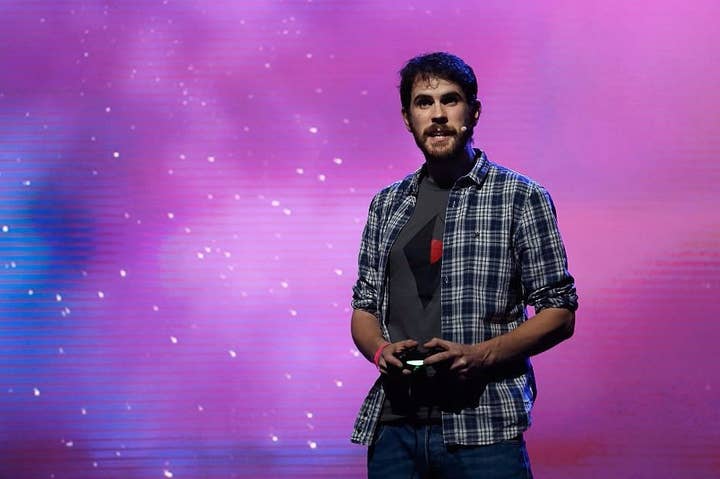No Man's Sky's hostile fans meet Vivendi's hostile takeover
Weekly recap: Hello Games receives death threats, The Sims 4 gets smart about gender, and Gameloft's Michel Guillemot makes way for Vivendi
In an age defined by ubiquitous, friction-free communication, those who create and sell products are now grappling with the dark underbelly of that old maxim: "the customer is always right." The kind of bilious threats that once arrived in sealed envelopes at corporate departments can now be personally targeted and publicly voiced. Such was the start of Sean Murray's week, his life threatened for having the temerity to ensure that Hello Games' most ambitious ever project, No Man's Sky, fulfils its considerable potential.
There are a great many reasons I feel proud to be associated with the games industry, but there are also times when I wonder if fans of other entertainment media behave with such a bewildering sense of entitlement. Fortunately, the last week provided ample positivity to counterbalance the hate, not least the news that the operators of the social networks on which that hatred so often plays out have committed to swifter action against those who spout it so freely. We can only hope that the stance taken by Facebook, Twitter, YouTube and Microsoft will be the start of broader change in social media of all kinds, like the pilot program being developed by Blizzard and Twitch to combat racist abuse in eSports.
"There are times when I wonder if fans of other entertainment media behave with such a bewildering sense of entitlement"
Now is certainly the time for reform, with the industry's audience continuing its expansion in every conceivable demographic - including, the ESA says, an increasingly large number of gamers over the age of 50. Acknowledgement of the gaming audience's diversity has led to progressive moves like this week's gender positive update to the Sims 4. However, the experiences of older generations remain virtually absent from games as a whole, and the industry has been accused of ageism when it comes to its hiring policies. If a business case can be made on the basis of a large number of older players, perhaps we can add another taboo to the growing list of those we've toppled.
There were other moments to lift the spirits this week, too. Starbreeze continued its ambitious resurgence with the latest in a growing line of acquisitions and partnerships that has made the Swedish company one of the most interesting in the industry. On this occasion, it paid 505 Games handsomely for full control of the Payday IP from which almost all of its current revenue flows. In doing so, it was able to remove the microtransactions imposed on Payday 2, which caused such a vitriolic backlash from its fanbase. Whether the goodwill it lost through that decision can ever be won back is another matter, but it will stand as a cautionary tale for any company building success around an engaged community. A company like Psyonix, for example, which has now earned $110 million in revenue through a strategy that hinges on giving Rocket League's players free content. If it can resist the temptation to add a few in-app purchases, we can expect that upward trajectory to continue.
"Vivendi reminded its new employees that Gameloft needed its, 'industrial and financial backing to develop.' They now have exactly that, whether they wanted it or not"
Microsoft isn't known for giving much away for free, but this week brought two acts that could be interpreted as generosity. The first was a $50 reduction in the price of the Xbox One, making the console just $299 in the US until June 13. Of course, that's also the day of Microsoft's E3 press conference, when those who were tempted by the offer might learn that slimmer, better value and (whisper it) more powerful versions could have been the reward for just two more weeks of patience. The second was a gesture towards the legion of companies dabbling in the nascent markets for virtual, augmented and mixed reality, extending its Windows Holographic platform beyond HoloLens to pretty much anyone with the capacity to make hardware. If popular, the move will provide developers with a unified AR/VR ecosystem and marketplace to address - one that Microsoft would have a great degree of control over, and make a great deal of money from.
Ambiguous motives also defined perhaps the week's single biggest story, as Vivendi seemed to complete its hostile takeover of Gameloft. After successfully convincing enough of the mobile publisher's shareholders to sell, Gameloft CEO Michel Guillemot is said to have resigned his post. In a letter of greeting, Vivendi reminded its new employees that Gameloft needed its, "industrial and financial backing to develop."
They now have exactly that, whether they wanted it or not.
Other news in brief...
- Two German publishers have joined forces to keep pace with a consolidating European games market. Gamigo AG and Aeria Games will unite their portfolios of online and mobile games to become a force on the international stage.
- Starbreeze has acquired the IP rights to Cinemaware's entire library of classic video games for €525,000 in cash. The company intends to rework the properties for VR in its, "location based IMAX centres."
- Dying Light developer Techland has announced its move into publishing. The initiative will operate under the name Techland Publishing, with a remit to find and support, "bold, unconventional games."
- Valve has now sold more than 500,000 units of its Steam Controller, which was designed to blend mouse-and-keyboard precision with console comfort.
- Games projects on Kickstarter have now raised $500 million collectively from more than 2 million backers. In an intriguing twist, success stories like Exploding Kittens and Cards Against Humanity mean that $265 million of that total has been given to tabletop games.

